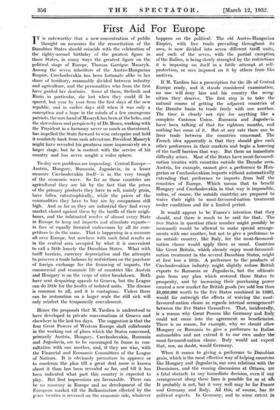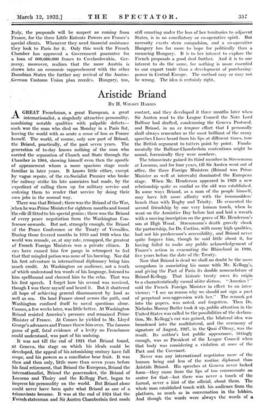First Aid For Europe
IT is noteworthy that a new concentration of public thought on measures far the resuscitation of the Danubian States should coincide with the celebration of the eighty-second birthday of the greatest figure in those States, in many ways the greatest figure on the political stage of Europe, Thomas Garrigue Masaryk. Among the seven inheritors of the Austro-Hungarian Empire, Czechoslovakia has been fortunate alike in her share of territory, reasonably divided between industry and agriculture, and the personalities who from the first have guided her destinies. Sonic of them, Stefanik and Resin in particular, she lost when they could ill be spared, but year by year from the first days of the new republic, and in earlier days still when it was only a conception and a hope in the minds of a few courageous patriots, the sure hand of Masaryk has been at the helm, and the shrewdness and perspicacity of Dr. Benes, working with the President in a harmony never so much as threatened, has impelled the State forward to wise enterprise and held it resolutely back from rash adventure. President Masaryk might have revealed his greatness more impressively on a larger stage, but he is content with the service of his country and has never sought a wider sphere.
To-day new problems arc impending. Central Europe— Austria, Hungary, Rumania, Jugoslavia, in a lesser measure Czechoslovakia itself—is in the very trough of the economic wave. So far as those countries are agricultural they arc hit by the fact that the prices of the primary products they have to sell, mainly grain, have fallen catastrophically, while the prices of the commodities they have to buy are by comparison still high. And so far as they are industrial they find every market closed against them by the tariffs of their neigh- bours, and the infatuated resolve of almost every State in Europe to keep out imports and stimulate exports— in face of equally frenzied endeavours by all its com- petitors to do the same. That is happening in a measure all over Europe, but nowhere with such fatal results as in the central area occupied by what it is convenient to call a little loosely the Danubian States. What with tariff barriers, currency depreciation and the attempts to preserve a trade balance by restrictions on the purchase of foreign exchange for the financing of imports, the commercial and economic life of countries like Austria and Hungary is on the verge of utter breakdown. Both have sent despairing appeals to Geneva, but the League can do little for the health of isolated units. The disease is common to all, and it is contagious. Unless there can be restoration on a larger scale the still sick will only reinfect the temporarily convalescent.
Hence the proposals that M. Tardieu is understood to have developed in private conversations at Geneva and elsewhere in the last ten days. The suggestion is that the four Great Powers of Western Europe shall collaborate in the working out of plans which the States concerned, primarily Austria, Hungary, Czechoslovakia, Rumania and Jugoslavia, are to be encouraged to frame in con- sultation with one another, and, if they are wise, with the Financial and Economic Committees of the League of Nations. It is obviously premature to approve or to condemn the plan till a great deal more is known about it than has been revealed so far, and till it has been indicated what part this country is expected to play. But first impressions are favourable. There can be no recovery in Europe and no development of the European market till the Balkanization effected by the peace treaties is reversed on the economic side, Whatever
happens on the political. The old Austro-Hungarian Empire, with free trade prevailing throughout its area, is now divided into seven different tariff units, and each of the seven, with the partial exception of the Italian, is being slowly strangled by the restrictions it is imposing on itself in a futile attempt at self- protection, or sees imposed on it by others from like motives.
If M. Tardieu has a prescription for the ills of Central Europe ready, and it stands considered examination, no one will deny him and his country the recog- nition they deserve. The first step is to take the natural course of getting the adjacent countries of the Danube basin to trade freely with one another. The time is clearly not ripe for anything like a complete Customs Union. Rumania and . Jugoslavia have been talking of that for eighteen months, and nothing has come of it. But at any rate there can be freer trade between the countries concerned. The French idea apparently is that they should give each other preferences in their markets and begin a lowering of the tariff bathers that way. But there an immediate difficulty arises. Most of the States have most-favoured- nation treaties with countries outside the Danube area, Austria,. for example, cannot give a preference to Hun- garian or Czechoslovakian imports without automatically extending that preference to imports from half the countries of Europe. Which means that to benefit Hungary and Czechoslovakia in that way is impossible, unless, of course, the outside countries are prepared to waive their right to most-favoured-nation treatment under conditions and for a limited period.
It would appear to be France's intention that they should, and there is much to be said for that. The five States in question (their number might possibly be increased) would be allowed to make special arrange- ments with one another, but not to give a preference to an outside country, like Italy, for the most-favoured- nation clause would apply there as usual. Countries like Great Britain, which already enjoy most-favoured- nation treatment in the several Danubian States, might at first lose a little. A preference to the products of Czechoslovakian industry might slightly reduce British exports to Rumania or J'ugoslavia, but the ultimate gain from any plan which restored those States to prosperity, and by increasing their purchasing power created a new market for British goods (we sold less than £8,000,000 worth to the five States combined in 1930), would far outweigh the effects of waiving the most- favoured-nation clause as regards internal arrangements between the five States themselves. That, incidentally, is a reason why Great Powers like Germany and Italy could not come into the agreement as beneficiaries. There is no reason, for example, why we should allow, Hungary or Rumania to give a preference to Italian automobiles and not extend it to our own under the most-favoured-nation clause. Italy would not - expect that, nor, no doubt, would Germany.
When it comes to giving a preference to Danubian grain, which is the most effective way of helping countries, like Hungary and Jugoslavia, our own relations with the Dominions, and the coming discussions at Ottawa, are, a fatal obstacle to 'any immediate decision, even if any arrangement along these lines is possible for us at Oh It probably is not, but it very well may be for France and Germany and Italy. All this, of course, has ita political aspects. In Germany, and to some extent ji Italy, the proposals will be suspect as coming from France, for the three Little Entente Powers are France's special clients. Whenever they need financial assistance they look to Paris for it. Only this week the French Chamber has approved a Government guarantee for a loan of 600,000,000 francs to Czechoslovakia. Ger- , many, moreover, realizes that the more Austria is drawn into an economic rapprochement with the other Danubian States the further any revival of the Austro- ,German Customs Union plan recedes. Hungary, too, still smarting under the loss of her territories to adjacent States, is in no conciliatory or co-operative spirit. But necessity exerts stern compulsion, and a co-operative Hungary has far more to hope for politically than a menacing Hungary. It is to her interest to explore the French proposals a good deal further. And it is to our interest to do the same, for nothing is more essential to our export trade than a development of purchasing- power in Central Europe. The method may or may not be wrong. The idea is certainly right.



















































 Previous page
Previous page